No products in the cart.
Great news! The Canada Post strike is over! We’re resuming deliveries to Canada!
Excellente nouvelle ! La grève de Postes Canada est terminée ! Nous reprenons les livraisons vers le Canada !
Great news! The Canada Post strike is over! We’re resuming deliveries to Canada!
Excellente nouvelle ! La grève de Postes Canada est terminée ! Nous reprenons les livraisons vers le Canada !
[category_image]
Almagel oral suspension bottle 170 ml
$17.94
Almagel is an antacid that relieves heartburn, gastritis, reflux, and ulcers. It protects the stomach lining and reduces acid for lasting relief.
Category: Gastrointestinal tract and liver
Brand: Teva
Pharmacological properties
Pharmacodynamics. Almagel is a balanced combination of aluminum hydroxide and magnesium hydroxide. The drug has an antacid effect when used in the recommended single dose (40-60 minutes after a meal) or daily dose during the day. Aluminum hydroxide neutralizes increased secretion of hydrochloric acid and reduces the activity of pepsin in the stomach, forming aluminum chloride, which, under the influence of alkaline intestinal contents, is converted into alkaline aluminum salts. They are poorly absorbed and practically do not change the concentration of aluminum salts in the blood with short-term use of Almagel (15-20 days). Aluminum hydroxide reduces the concentration of phosphates, binding phosphate ions in the intestine and thus limiting their absorption. The use of the drug does not cause alkalosis and does not contribute to the formation of CO2 in the stomach. Magnesium hydroxide also neutralizes hydrochloric acid in the stomach, turning into magnesium chloride, which has a slight laxative effect.
Almagel, like other antacids containing aluminum, has a protective effect on the gastric mucosa due to the stimulation of prostaglandin synthesis. This increases its resistance and protects against necrotic inflammatory and erosive-hemorrhagic lesions caused by the use of irritating and ulcerogenic agents, such as acetylsalicylic acid, nonsteroidal anti-inflammatory drugs, ethanol. On the other hand, aluminum hydroxide has a pronounced astringent and anti-inflammatory effect on the inflamed gastric and duodenal mucosa when the drug is used 10-15 minutes before meals.
Sorbitol exhibits a mild intrusive and moderate choleretic effect, as well as a moderate laxative effect, which compensates for the tendency to constipation under the influence of aluminum hydroxide in most patients.
Pharmacokinetics. Aluminum salts are absorbed slightly in the intestine and excreted in the feces. With normal kidney function, the plasma level of aluminum practically does not change. Magnesium ions are absorbed only by 10%, and their concentration in the blood almost does not change. The duration of action depends on the rate of gastric emptying. When used on an empty stomach, it varies from 20 to 60 minutes. When used 1 hour after a meal, the antacid effect can last up to 3 hours.
Indication
Symptomatic treatment of diseases of the digestive tract accompanied by increased acidity of gastric juice, such as esophagitis, hiatal hernia, gastroesophageal reflux disease, acute and chronic gastritis, gastroduodenitis, gastric and duodenal ulcers, post-resection gastritis and gastroanastomosis in the presence of gastroesophageal reflux (heartburn).
Prophylactically to reduce the irritating and ulcerogenic effects of certain drugs on the mucous membrane of the esophagus, stomach and duodenum (e.g. corticosteroids, nonsteroidal anti-inflammatory drugs).
Application
Symptomatic treatment of diseases of the digestive tract, accompanied by increased acidity of gastric juice. Adults and children over 14 years old – 5-10 ml (1-2 measuring spoons) 3 times a day or 1 sachet 3 times a day. If necessary, a single dose can be increased to 15 ml – 3 measuring (dosing) spoons. After achieving a therapeutic effect, the dose is reduced to 5 ml 3-4 times a day for 2-3 months. Do not drink water for 15 minutes after using the drug.
In order to achieve a symptomatic antacid effect, Almagel is usually used 45-60 minutes after meals and in the evening before bedtime.
For prevention. Adults and children over 14 years old – 5-15 ml (1-3 measuring spoons) or 1 sachet 15 minutes before taking medications that irritate the mucous membrane of the esophagus, stomach or duodenum. Children aged 10-14 years should be prescribed half the dose recommended for adults. The recommended duration of treatment is 12 days.
If the drug is prescribed in a single dose of 5 or 15 ml, it is recommended to use Almagel in bottles, since this type of packaging includes a dosing spoon, which allows you to accurately measure the required volume of the drug.
Before use, the suspension must be thoroughly homogenized by shaking the bottle or kneading the sachet. The required amount of the drug from the bottle is measured using the dosing spoon included in the kit. When using the drug in sachets, the following recommendations must be followed: hold the sachet vertically, cut or tear off one of the corners at the marked place. Pour the contents of the sachet through the opening of the sachet into a spoon or directly into the oral cavity.
Patients with renal insufficiency. When treating patients with impaired renal function, it is necessary to reduce the dose or increase the interval between doses.
Children: Do not use in children under 10 years of age, as accurate dosing is not possible.
Contraindication
The drug is not recommended for use in case of hypersensitivity to its components, habitual constipation, Alzheimer’s disease, intense abdominal pain of unspecified origin, suspected acute appendicitis, presence of ulcerative colitis, colostomy or ileostomy, chronic diarrhea, hemorrhoids, severe renal failure, hypophosphatemia, during breastfeeding.
Side effects
On the part of the gastrointestinal tract: possible manifestations of constipation, which disappear with a decrease in the dose, diarrhea; change in the color of feces, nausea, vomiting, stomach cramps;
laboratory indicators: most often in patients with renal failure and in case of prolonged use or taking the drug in high doses due to hypermagnesemia, hyperaluminemia, intoxication with magnesium and aluminum develops; hypophosphatemia (manifestations of which may be decreased appetite, muscle weakness, decreased body weight); hypocalcemia, hypercalciuria are possible;
Kidney and urinary tract disorders: nephrocalcinosis, renal dysfunction;
hypersensitivity reactions: local and general allergic reactions, including itching, urticaria, angioedema and anaphylactic reactions, bronchospasm;
from the central nervous system: with prolonged use of the drug in patients with renal failure and patients on dialysis, manifestations of encephalopathy, neurotoxicity (changes in mood and mental activity) are possible; dementia, impaired condition in Alzheimer’s disease;
from the musculoskeletal system: osteoporosis; with prolonged use of the drug in high doses against the background of phosphorus deficiency in food, osteomalacia may occur;
others: change in taste sensations.
With prolonged use of the drug in patients with renal failure and in patients on dialysis, thirst, decreased blood pressure, hyporeflexia, and the development of microcytic anemia are possible.
Special instructions
The use of the drug is not recommended in patients with diverticulosis, acid-base imbalance in the body in the presence of metabolic alkalosis, cirrhosis of the liver, severe heart failure, toxicosis of pregnancy, renal disorders (due to the risk of developing hypermagnesemia and aluminum intoxication).
Patients should consult a doctor if they experience weight loss, difficulty swallowing, or persistent abdominal discomfort, new digestive disorders, or a change in existing digestive disorders.
Aluminum hydroxide may cause constipation, and magnesium hydroxide may cause intestinal hypokinesia. The use of this drug in high doses may cause or aggravate intestinal obstruction and intestinal ileus, especially in patients at increased risk of such complications, such as patients with renal insufficiency or elderly patients.
The use of antacids containing aluminum should be limited in elderly patients. Prolonged use in elderly patients may worsen existing bone and joint diseases.
With prolonged use of the drug, it is necessary to ensure that the body receives a sufficient amount of phosphorus, since aluminum hydroxide binds to phosphates and reduces their absorption from the digestive tract. Increased urinary calcium excretion, which can lead to disturbances in calcium-phosphate balance and create conditions for the development of osteomalacia (symptoms – complaints of weakness and pain in the bones). Aluminum hydroxide can be dangerous when used in patients with porphyria who are on hemodialysis.
With prolonged use (14 days), regular monitoring by a doctor and monitoring of plasma levels of magnesium and aluminum are necessary in the treatment of patients with renal failure. In this category of patients, it is also necessary to monitor the dynamics of kidney function, ulcer size, and the appearance of diarrhea.
During treatment, it is not recommended to consume alcohol and caffeine due to a decrease in the effect of the drug.
Excipients. The drug contains sorbitol, which allows it to be taken by diabetics, but should not be used in patients with congenital fructose intolerance, as it may cause stomach irritation and diarrhea.
The drug contains parabens, which can provoke urticaria and very rarely – immediate allergic reactions – bronchospasm.
The drug contains ethyl alcohol, which may cause complications in patients with liver and brain diseases, in patients with epilepsy and alcoholism, in pregnant women and children under 10 years of age.
Use during pregnancy and breastfeeding. There are no clinical studies on the use of Almagel in pregnant women, so the drug is not recommended for use during pregnancy. If necessary, Almagel can be used during pregnancy only as prescribed by a doctor, if the expected benefit to the mother outweighs the possible risk to the fetus / child. In this case, the drug is recommended to be used for no more than 5-6 days and only under the supervision of a doctor.
It is necessary to take into account the content of aluminum and magnesium ions, which can affect the transit of gastrointestinal contents, namely:
- Magnesium hydroxide salts can cause diarrhea;
- Aluminum salts can cause constipation, which can worsen constipation, which often occurs during pregnancy, so long-term use and overdose of the drug should be avoided.
The drug is not recommended for use in pregnant women with toxicosis.
Breastfeeding. There is no data on the ability of the active substances of the drug to penetrate into breast milk, therefore, if treatment with it is necessary, breastfeeding should be discontinued.
Ability to influence the reaction rate when driving vehicles or working with other mechanisms. Ethanol, contained in the preparations in the specified amount, cannot affect the ability to drive vehicles or work with complex mechanisms when taken in recommended daily doses.
Interactions
The interval between the use of Almagel and other medications should be ≥1-2 hours.
Almagel changes the acidity of gastric contents, which affects the absorption, bioavailability, maximum plasma concentrations, and excretion of most drugs when used simultaneously.
Almagel reduces the absorption of digoxin, indomethacin, salicylates, chlorpromazine, phenytoin, reserpine, H2-receptor blockers (cimetidine, ranitidine, famotidine), lansoprazole, β-adrenoceptor blockers (e.g. atenolol, metoprolol, propranolol), chloroquine, cycline, diflunisal, diphosphonates, quinolones (ciprofloxacin, norfloxacin, ofloxacin, enoxacin, grepafloxacin), azithromycin, cefpodoxime, pivampicillin, rifampicin, indirect anticoagulants, barbiturates, fexofenadine, sodium fluoride, dipyridamole, zalcitabine, bile acids (chenodeoxycholic and ursodeoxycholic acids), penicillamine, digitalis glycosides, iron salts, lithium preparations, quinidine, mexiletine, phenothiazine drugs, tetracycline antibiotics, lincosamides, phosphorus (supplements), anti-tuberculosis drugs (ethambutol, isoniazid for oral use), chloroquine, glucocorticoid drugs (interaction with prednisolone and dexamethasone is known), kayexelate and ketoconazole. Therefore, if possible, the time interval between taking Almagel and these drugs should be 2 hours.
The lower absorption of these drugs is associated with the formation of insoluble complexes and/or alkalization of gastric contents.
With the simultaneous use of enteric-coated drugs, the increased alkalinity of gastric juice can lead to accelerated destruction of their membrane and cause irritation of the stomach and duodenum.
M-cholinergic receptor blockers slow down gastric emptying and enhance and prolong the effect of Almagel.
Quinidine excretion may be impaired with quinidine toxicity, especially in patients with renal insufficiency. Concomitant use of aluminum hydroxide and citrates may lead to increased aluminum levels, especially in patients with renal insufficiency. The drug may reduce the absorption of folic acid.
When used in combination with levothyroxine, its hormonal effect may be reduced.
Pirenzepine enhances and prolongs the effect of Almagel.
Effect on laboratory tests. Almagel may affect the results of some laboratory and functional studies and tests: it reduces the level of gastric secretion when determining its acidity; disrupts the test for visualization of diverticula and bone scintigraphy using technetium (99 Tc); moderately and for a short time increases the plasma level of gastrin, increases the plasma level of phosphorus, pH of blood plasma and urine.
Overdose
With a single accidental intake of the drug in a high dose, no other signs of overdose are noted except constipation, flatulence, and a metallic taste in the mouth.
With prolonged use of the drug in high doses, kidney stones may form, severe constipation, abdominal pain, drowsiness, hypermagnesemia may occur. Signs of metabolic alkalosis may also occur – changes in mood or mental activity, numbness or pain in the muscles, nervousness or fatigue, slow breathing, unpleasant taste sensations.
Treatment: it is necessary to immediately take measures for the rapid elimination of the drug – wash the stomach, induce vomiting, take enterosorbents. In case of magnesium overdose, rehydration and forced diuresis are recommended. Calcium gluconate can be used intravenously. In case of renal failure, hemodialysis or peritoneal dialysis is necessary.
Storage conditions
Store at ≤25 °C in the original packaging. Do not freeze.
Information about the medicinal product for healthcare professionals.
Be the first to review “Almagel oral suspension bottle 170 ml” Cancel reply
You may also like


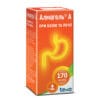
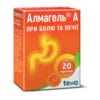
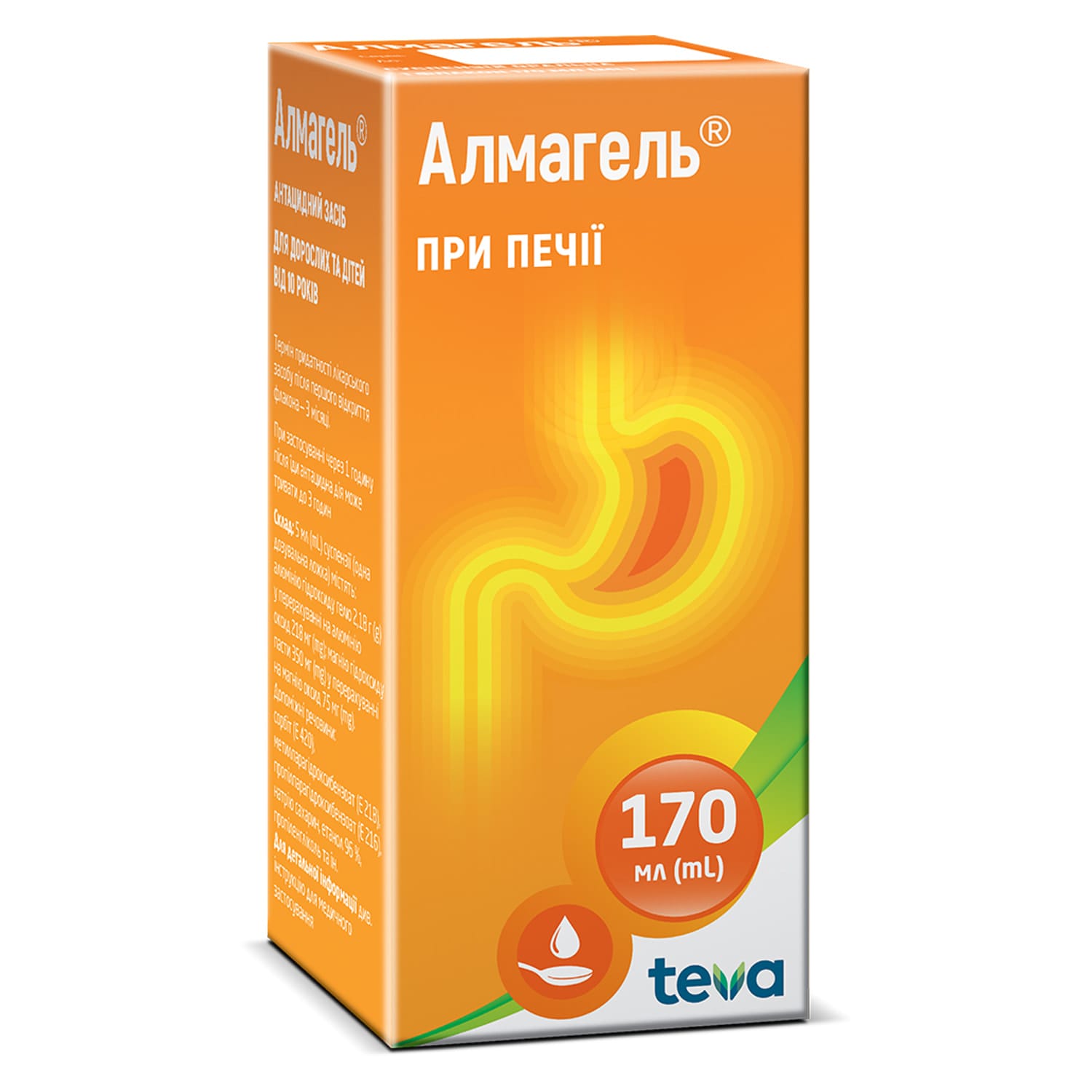
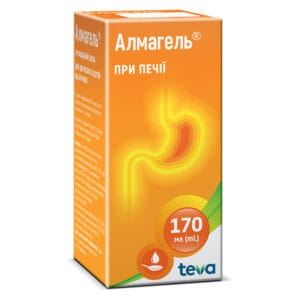
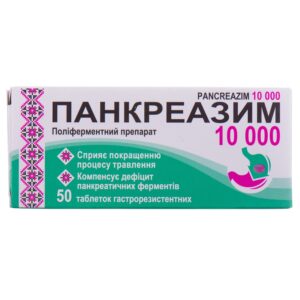
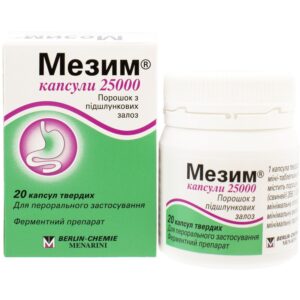
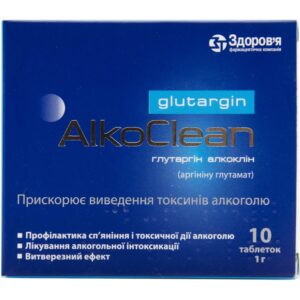

Reviews
There are no reviews yet.